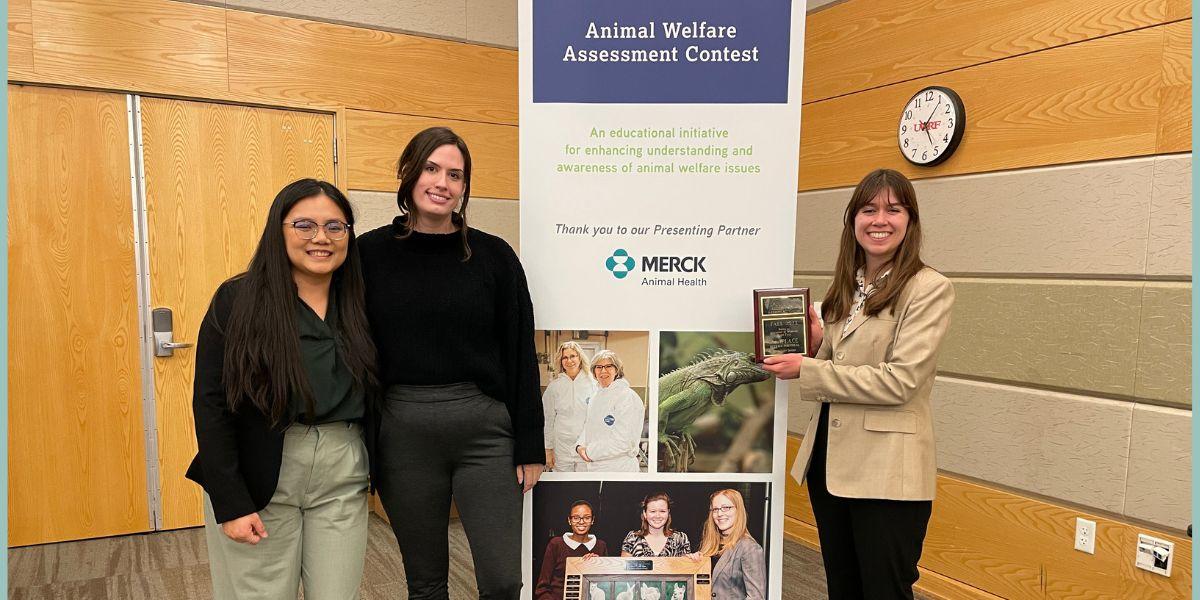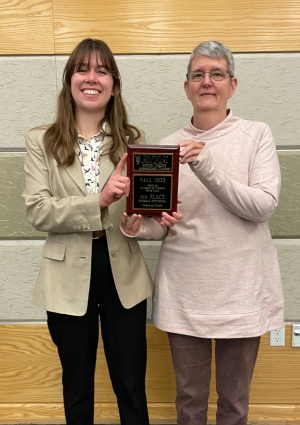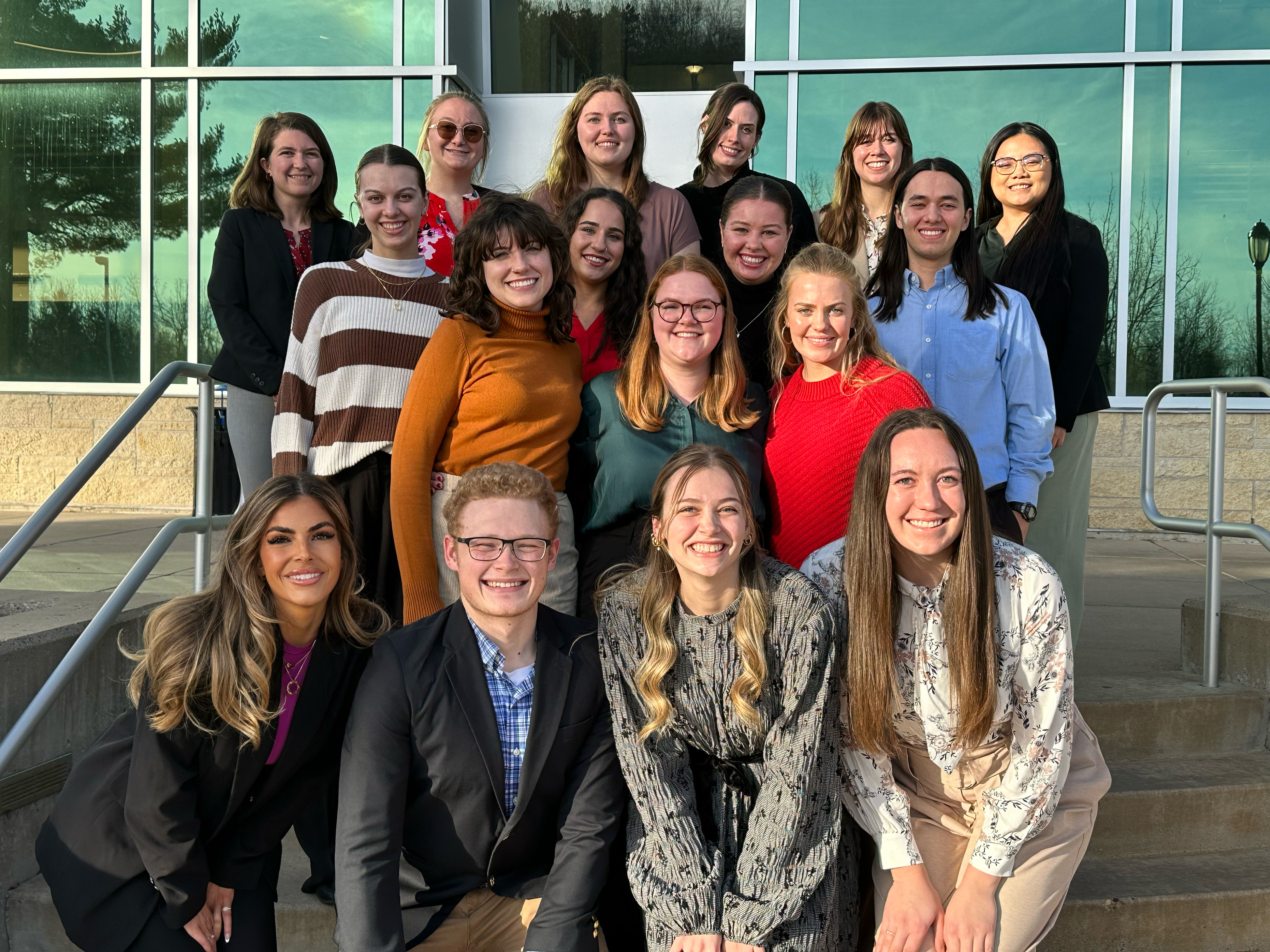All in the details
CVM’s first DVM student team competes in AVMA’s Fall 2023 Animal Welfare Assessment Contest

CVM’s first DVM student team competes in AVMA’s Fall 2023 Animal Welfare Assessment Contest
(Left to right) College of Veterinary Medicine DVM students Esther Lam, Saree Shogren, and Shyanne Hall competed in the Fall 2023 Animal Welfare Assessment Contest.
College of Veterinary Medicine (CVM) DVM students Shyanne Hall, Esther Lam, and Saree Shogren resembled detectives as they combed through a laboratory on the hunt for clues to gauge the welfare of the facility’s rats.
They couldn’t speak to one another, only examine equipment and items such as animal cages and medication bottles. Once their time was up, the group came together to recount their observations and put together a presentation for a panel of judges.
Ultimately, the laboratory and its rats were fictitious—all part of the American Veterinary Medical Association's (AVMA) Fall 2023 Animal Welfare Assessment Contest held in mid-November—but the experience Hall, Lam, and Shogren gained from participating in the competition was very real.
“The learning is so much more emphasized than the competition,” says Hall, a first-year student who plans to pursue a career in wildlife veterinary medicine. “The competition is fun, but the point of the event isn't to compete. It's to learn and to have important conversations about how we can best take care of animals.”

First held in 2002, the Animal Welfare Assessment Contest invites undergraduate, graduate, and veterinary students from across the country to assess the welfare of animals in a variety of settings using science-based methods and reasoning. The University of Minnesota has sent undergraduate teams to the contest for several years, but this year marks the first time the College of Veterinary Medicine has organized and sent a team.
In addition to participating as a team, students can compete as individuals. Individuals are presented with a scenario and supporting details in a virtual format and then asked to form and present an assessment based on the provided information and their knowledge.
Hall placed fourth in the veterinary division of the individual competition. Overall, the UMN teams tallied 11 placings, including first place in the undergraduate junior and senior individual divisions, first place in the undergraduate senior team division, and second place in the undergraduate junior team division. (Click here for a full list of results.)
Getting ready for the contest involves hours of collaboration, research, and practice. The UMN teams prepare as part of a class taught by College of Food, Agricultural, and Natural Resource Sciences assistant teaching professor Dr. Rielle Perttu, who serves as one of the teams’ coaches.
Students receive the species they’ll be assessing for the contest in advance and get to work learning as much as they can. Welfare information gathered on each species includes housing, enrichment, behavior, pain, cognition, social behavior, management, routine procedures, stress, health, nutrition, transport, end of life, and other special topics.
“The students were required to dive into all scientific literature available on the species, digest it into a literature review, then disseminate it to their peers,” Perttu says.

Next, a select group of students created a practice scenario similar to those presented in the contest and delivered the scenario to the class, giving students an opportunity to work on their oral delivery skills for the welfare assessment.
Finally, students travel to zoos, research labs, farms, and more to observe live animals and finish preparing guides for assessing their welfare. There is no internet access during the competition, so participants must rely on the materials they’ve prepared to support their assessment.
While the contest allows students to test their assessment skills outside a classroom, CVM faculty members are working to incorporate more formal education and training in animal welfare into CVM’s curriculum, according to Dr. Michelle Willette, an assistant professor in the Department of Veterinary Population Medicine who also coaches the UMN contest teams.
“Veterinarians assess welfare every day with every patient, regardless of the species or the setting,” she says “Like all areas of expertise, animal welfare science and ethics need to be studied, and assessing animal welfare is a skill that needs to be developed and practiced.”
Veterinary students interested in competing in the contest can contact Dr. Michelle Willette at wille203@umn.edu.